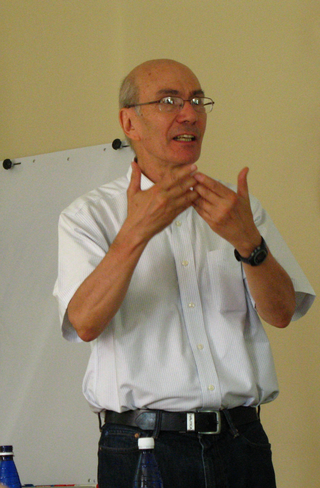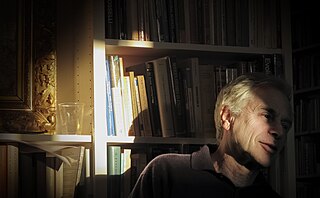Related Research Articles
Epistemology is the branch of philosophy that examines the nature, origin, and limits of knowledge. Also called theory of knowledge, it explores different types of knowledge, such as propositional knowledge about facts, practical knowledge in the form of skills, and knowledge by acquaintance as a familiarity through experience. Epistemologists study the concepts of belief, truth, and justification to understand the nature of knowledge. To discover how knowledge arises, they investigate sources of justification, such as perception, introspection, memory, reason, and testimony.
Internalism and externalism are two opposite ways of integration of explaining various subjects in several areas of philosophy. These include human motivation, knowledge, justification, meaning, and truth. The distinction arises in many areas of debate with similar but distinct meanings. Internal–external distinction is a distinction used in philosophy to divide an ontology into two parts: an internal part concerning observation related to philosophy, and an external part concerning question related to philosophy.

The philosophy of perception is concerned with the nature of perceptual experience and the status of perceptual data, in particular how they relate to beliefs about, or knowledge of, the world. Any explicit account of perception requires a commitment to one of a variety of ontological or metaphysical views. Philosophers distinguish internalist accounts, which assume that perceptions of objects, and knowledge or beliefs about them, are aspects of an individual's mind, and externalist accounts, which state that they constitute real aspects of the world external to the individual. The position of naïve realism—the 'everyday' impression of physical objects constituting what is perceived—is to some extent contradicted by the occurrence of perceptual illusions and hallucinations and the relativity of perceptual experience as well as certain insights in science. Realist conceptions include phenomenalism and direct and indirect realism. Anti-realist conceptions include idealism and skepticism. Recent philosophical work have expanded on the philosophical features of perception by going beyond the single paradigm of vision.

Charles Margrave Taylor is a Canadian philosopher from Montreal, Quebec, and professor emeritus at McGill University best known for his contributions to political philosophy, the philosophy of social science, the history of philosophy, and intellectual history. His work has earned him the Kyoto Prize, the Templeton Prize, the Berggruen Prize for Philosophy, and the John W. Kluge Prize.

In the philosophy of religion, Reformed epistemology is a school of philosophical thought concerning the nature of knowledge (epistemology) as it applies to religious beliefs. The central proposition of Reformed epistemology is that beliefs can be justified by more than evidence alone, contrary to the positions of evidentialism, which argues that while non-evidential belief may be beneficial, it violates some epistemic duty. Central to Reformed epistemology is the proposition that belief in God may be "properly basic" and not need to be inferred from other truths to be rationally warranted. William Lane Craig describes Reformed epistemology as "One of the most significant developments in contemporary religious epistemology ... which directly assaults the evidentialist construal of rationality."
Naturalized epistemology is a collection of philosophic views about the theory of knowledge that emphasize the role of natural scientific methods. This shared emphasis on scientific methods of studying knowledge shifts the focus of epistemology away from many traditional philosophical questions, and towards the empirical processes of knowledge acquisition. There are noteworthy distinctions within naturalized epistemology. Replacement naturalism maintains that we should abandon traditional epistemology and replace it with the methodologies of the natural sciences. The general thesis of cooperative naturalism is that traditional epistemology can benefit in its inquiry by using the knowledge we have gained from cognitive sciences. Substantive naturalism focuses on an asserted equality of facts of knowledge and natural facts.
Jacques Genest was a Canadian physician and scientist. He founded the Institut de recherches cliniques de Montréal (IRCM) and was an emeritus professor at Université de Montréal and a professor at McGill University. Genest was best known for founding and leading several organizations related to clinical research in Québec and for his work on arterial hypertension.

Stephen P. Stich is an American academic who is Distinguished Professor of Philosophy and Cognitive Science Emeritus at Rutgers University, as well as an Honorary Professor in Philosophy at the University of Sheffield. Stich's main philosophical interests are in the philosophy of mind, epistemology, and moral psychology. His 1983 book, From Folk Psychology to Cognitive Science: The Case Against Belief, received much attention as he argued for a form of eliminative materialism about the mind. He changed his mind, in later years, as indicated in his 1996 book Deconstructing the Mind.
Metaepistemology is the branch of epistemology and metaphilosophy that studies the underlying assumptions made in debates in epistemology, including those concerning the existence and authority of epistemic facts and reasons, the nature and aim of epistemology, and the methodology of epistemology.
Hilary Kornblith is an American philosopher. He is a professor of philosophy at the University of Massachusetts Amherst and one of contemporary epistemology's most prominent proponents of naturalized epistemology.
Paul Montgomery Churchland is a Canadian philosopher known for his studies in neurophilosophy and the philosophy of mind. After earning a Ph.D. from the University of Pittsburgh under Wilfrid Sellars (1969), Churchland rose to the rank of full professor at the University of Manitoba before accepting the Valtz Family Endowed Chair in Philosophy at the University of California, San Diego (UCSD) and joint appointments in that institution's Institute for Neural Computation and on its Cognitive Science Faculty.

Dan Sperber is a French social and cognitive scientist, anthropologist and philosopher. His most influential work has been in the fields of cognitive anthropology, linguistic pragmatics, psychology of reasoning, and philosophy of the social sciences. He has developed: an approach to cultural evolution known as the epidemiology of representations or cultural attraction theory as part of a naturalistic reconceptualization of the social; relevance theory; the argumentative theory of reasoning. Sperber formerly Directeur de Recherche at the Centre National de la Recherche Scientifique is Professor in the Departments of Cognitive Science and of Philosophy at the Central European University in Budapest.
Epistemology or theory of knowledge is the branch of philosophy concerned with the nature and scope (limitations) of knowledge. It addresses the questions "What is knowledge?", "How is knowledge acquired?", "What do people know?", "How do we know what we know?", and "Why do we know what we know?". Much of the debate in this field has focused on analyzing the nature of knowledge and how it relates to similar notions such as truth, belief, and justification. It also deals with the means of production of knowledge, as well as skepticism about different knowledge claims.
The study and teaching of philosophy in Canada date from the time of New France. Generally, Canadian philosophers have not developed unique forms of philosophical thought; rather, Canadian philosophers have reflected particular views of established European and later American schools of philosophical thought, be it Thomism, Objective Idealism, or Scottish Common Sense Realism. Since the mid-twentieth century the depth and scope of philosophical activity in Canada has increased dramatically. This article focuses on the evolution of epistemology, logic, the philosophy of mind, metaphysics, ethics and metaethics, and continental philosophy in Canada.
John L. Pollock (1940–2009) was an American philosopher known for influential work in epistemology, philosophical logic, cognitive science, and artificial intelligence.
Evan Thompson is a professor of philosophy at the University of British Columbia. He writes about cognitive science, phenomenology, philosophy of mind, and cross-cultural philosophy, especially Buddhist philosophy in dialogue with Western philosophy of mind and cognitive science.
Walter Sinnott-Armstrong is an American philosopher specializing in ethics, epistemology, neuroethics, the philosophy of law, and the philosophy of cognitive science. He is the Chauncey Stillman Professor of Practical Ethics in the Department of Philosophy and the Kenan Institute for Ethics at Duke University.
Andrew Brook is a Canadian philosopher, author and academic particularly known for his writings on Immanuel Kant and the interplay between philosophy and cognitive science. Brook is Chancellor's Professor Emeritus of Philosophy and Cognitive Science at Carleton University, former President of the Canadian Psychoanalytic Society, and former President of the Canadian Philosophical Association.

Valéry Giroux is a Canadian philosopher, lawyer and animal rights activist from Quebec. She is an adjunct professor at the Université de Montréal Faculty of Law, associate director for the Centre de recherche en éthique, a Fellow of the Oxford Centre for Animal Ethics, and an author and speaker on animal ethics issues and veganism, with a notable focus on the topic of antispeciesism through her co-editorship of the antispeciesist journal L'Amorce. Her philosophy argues for the equal moral consideration of all sentient beings, objects to the ethical notion that the utilization of non-human animals by humans as being morally permissible, and advocates for the individual right to freedom for all sentient beings, regardless of their species, emphasizing negative or republican freedom over positive freedom.

Eric Racine FCAHS, is the Director of the Pragmatic Health Ethics Research Unit based at the Montreal Clinical Research Institute, a research professor at the Université de Montréal and the Montreal Clinical Research Institute, and an adjunct professor in the Department of Neurology and Neurosurgery at McGill University.
References
- ↑ "Murray Clarke - Concordia University". www.concordia.ca. Retrieved 2024-12-17.
- ↑ Clarke, Murray (2004). Reconstructing reason and representation. MIT Press. OCLC 53132442 . Retrieved 14 August 2021.